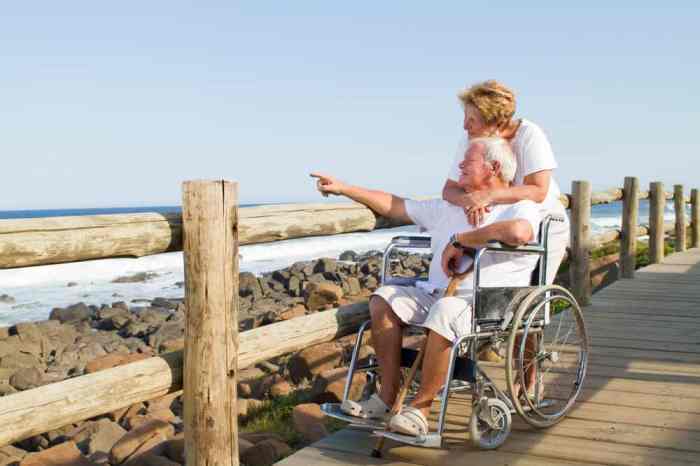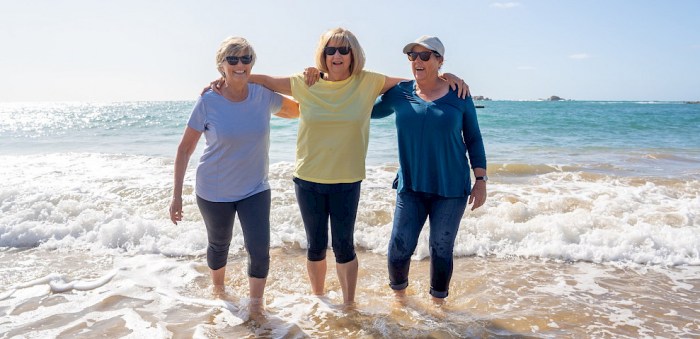
Senior travel packages offer a unique opportunity for older adults to explore the world, enjoying tailored experiences that prioritize comfort, safety, and convenience. This guide delves into the various aspects of planning a fulfilling and memorable senior travel experience, from choosing the right package to budgeting effectively and ensuring a smooth journey.
We’ll explore popular destinations, compare different travel styles (escorted tours, independent travel, cruises), and address crucial health and safety considerations. Furthermore, we’ll provide practical tips on finding affordable options, maximizing travel rewards, and selecting accessible accommodations and transportation.
Senior Travel Package Preferences
Senior travel is a booming market, with individuals aged 55 and over increasingly seeking enriching and comfortable travel experiences. Understanding their preferences is crucial for designing successful and appealing packages. This section details popular destinations, common package features, and comparisons between different travel styles catering to this demographic.
Popular Destinations for Senior Travelers
Popular destinations for senior travelers often prioritize accessibility, safety, and cultural richness. Europe, particularly countries like Italy, France, and the UK, consistently rank highly due to their historical sites, charming towns, and relatively good infrastructure. Cruises to the Caribbean and Alaska also prove extremely popular, offering ease of movement and a wide range of onboard amenities. Other sought-after destinations include Japan, known for its serene beauty and efficient public transportation, and Canada, with its stunning natural landscapes and comfortable climate.
These locations balance adventure with relaxation, catering to the diverse interests of senior travelers.
Features Included in Senior-Focused Travel Packages
Senior-focused travel packages often include features designed to enhance comfort and convenience. Accessible transportation, such as wheelchair-friendly buses and trains, is a common inclusion. Packages frequently incorporate carefully planned itineraries with manageable daily activities, avoiding excessive walking or strenuous exertion. Many providers offer options for single occupancy rooms to ensure privacy and comfort. Crucially, many packages include readily available medical assistance options, such as 24/7 access to medical professionals or partnerships with local hospitals.
This reassurance significantly reduces stress and allows seniors to travel with greater confidence. Some packages even include travel insurance specifically designed for senior travelers.
Comparison of Senior Travel Package Types
Senior travelers have a variety of travel package options to choose from, each with its own advantages and disadvantages. Escorted tours offer the convenience of pre-arranged itineraries, transportation, and guided excursions, providing a structured and worry-free experience. Independent travel packages, on the other hand, offer greater flexibility and freedom, allowing seniors to explore at their own pace and tailor their experiences to personal interests.
Cruises provide all-inclusive amenities and a wide range of onboard activities, but may involve more structured schedules and potentially higher costs. The best choice depends on individual preferences and priorities.
Senior Travel Package Overview
| Package Type | Destination Focus | Key Features | Price Range (Example) |
|---|---|---|---|
| Escorted Tour | Europe (Italy, France, UK), Japan | Guided excursions, pre-arranged transportation, accessible accommodations, medical assistance information | $3,000 – $10,000 per person |
| Independent Travel Package | Various (depending on individual preferences) | Flexible itineraries, self-guided exploration, options for accessible transportation and accommodation | $1,500 – $7,000 per person |
| Cruise | Caribbean, Alaska, Mediterranean | All-inclusive amenities, onboard activities, accessible cabins (often available at extra cost), medical facilities onboard | $2,000 – $8,000 per person (depending on cabin type and itinerary) |
Health and Safety Considerations in Senior Travel
Planning a trip for senior travelers requires careful consideration of health and safety aspects to ensure a smooth and enjoyable experience. This involves proactive measures to mitigate potential risks and maximize comfort throughout the journey. Failing to address these concerns can significantly impact the overall trip and potentially lead to unforeseen complications.
Essential Health and Safety Considerations for Senior Travelers
Prior to departure, a comprehensive health assessment is crucial. This should include a consultation with their physician to discuss any pre-existing conditions, necessary medications, and potential health risks associated with travel. The physician can provide tailored advice and recommendations, including necessary vaccinations and precautions for the specific destination. Furthermore, seniors should pack a well-stocked first-aid kit containing essential medications, bandages, antiseptic wipes, and any other personal medical supplies they may require.
Staying hydrated is also paramount, especially in warmer climates. Seniors should drink plenty of water throughout the day to prevent dehydration. Finally, regular exercise before and during the trip can help maintain physical fitness and reduce the risk of injury or fatigue.
Recommended Travel Insurance Options for Seniors
Choosing the right travel insurance is paramount for senior travelers. Standard travel insurance policies may not adequately cover the specific needs of older adults, who may be more susceptible to health issues while traveling. Therefore, it is essential to look for policies specifically designed for seniors, which often include broader coverage for medical emergencies, evacuations, and pre-existing conditions.
Several reputable companies offer specialized senior travel insurance plans; comparing options and coverage details is vital before making a decision. Some plans might offer coverage for trip cancellations due to medical reasons, lost luggage, and other unforeseen circumstances. Examples of features to consider include medical expenses coverage exceeding a certain amount, emergency medical evacuation provisions, and repatriation of remains.
Reading the fine print and understanding the policy exclusions is crucial.
Checklist of Documents and Medications Seniors Should Carry While Traveling
Carrying essential documents and medications is critical for a smooth and safe trip. A comprehensive checklist should include a copy of their passport or other travel documents, travel insurance information, flight or cruise itineraries, accommodation confirmations, emergency contact information, and a list of prescribed medications with dosages. Medications should be carried in their original containers with labels clearly visible.
It is also advisable to carry a copy of their medical history and any relevant medical records. Consider making a digital copy of these documents as well, storing them securely in the cloud or on a separate device. This will provide a backup in case of loss or theft of the physical documents.
Choosing Accessible Accommodations and Transportation Options for Seniors with Mobility Challenges
For seniors with mobility challenges, choosing accessible accommodations and transportation is crucial for comfort and safety. When booking flights, accommodations, and transportation, it is important to explicitly request accessible options and inquire about the specific accessibility features available. This includes requesting wheelchair assistance at airports, booking rooms with roll-in showers and grab bars, and selecting transportation options with ramps or lifts.
Many hotels and airlines offer accessible rooms and services, but it is essential to confirm their availability in advance to avoid disappointment. Researching and selecting accommodations and transportation providers with a strong reputation for accessibility is vital to ensure a comfortable and safe travel experience. Look for reviews mentioning accessibility features and services provided.
Budgeting for Senior Travel Packages
Planning a senior travel experience requires careful consideration of costs to ensure a comfortable and enjoyable trip without breaking the bank. This section will explore strategies for finding affordable packages, comparing transportation costs, budgeting for daily expenses, and providing a sample budget for a week-long trip. Effective budgeting is key to maximizing your travel experience while remaining within your financial means.
Finding Affordable Senior Travel Packages
Several strategies can help seniors find affordable travel packages. Websites specializing in senior travel often offer discounts and deals. These sites frequently aggregate offers from various tour operators, allowing for easy comparison shopping. Consider traveling during the shoulder season (spring or fall) to avoid peak season prices. Booking well in advance can also secure better rates and availability.
Look for packages that include bundled services, such as flights, accommodation, and some excursions, as these often offer better value than booking individual components separately. Finally, consider less popular destinations, which may offer comparable experiences at lower costs.
Transportation Cost Comparison for Seniors
The cost of transportation significantly impacts the overall budget. Flights are generally the fastest option but can be the most expensive, particularly for long-distance travel. Train travel offers a more relaxed and scenic journey, often at a more competitive price than flights for shorter distances. Cruises provide an all-inclusive option, with transportation, accommodation, and some meals included in the package price.
However, cruise costs can vary widely depending on the ship, itinerary, and cabin type. For shorter trips or regional exploration, bus travel can be a budget-friendly alternative. The best mode of transportation depends on the destination, trip length, and individual preferences.
Budgeting for Meals, Activities, and Incidentals, Senior travel packages
Allocating a realistic budget for daily expenses is crucial. Meal costs can vary greatly depending on dining choices. Packing some snacks and opting for less expensive eateries can help control food costs. Consider the cost of planned activities and excursions. Some packages include certain activities, while others require separate purchases.
Factor in incidental expenses such as souvenirs, tips, and unexpected costs. A contingency fund of 10-20% of the total budget is recommended to cover unforeseen circumstances.
Sample Budget Breakdown: 7-Day Senior Travel Package to Quebec City, Canada
This example assumes a moderate level of spending and is for illustrative purposes only. Actual costs will vary depending on the specific choices made.
| Category | Estimated Cost (USD) |
|---|---|
| Flights (roundtrip) | $800 |
| Accommodation (7 nights) | $700 |
| Meals (7 days) | $500 |
| Activities & Excursions | $300 |
| Transportation (local) | $100 |
| Incidentals & Contingency | $200 |
| Total Estimated Cost | $2600 |
Note: This budget excludes travel insurance, which is highly recommended for senior travelers.
Flight Deals and Hacks for Seniors
Securing affordable airfare is crucial for budget-conscious senior travelers. This section explores various strategies and resources to help you find the best flight deals and maximize your travel budget. We’ll cover websites and apps, frequent flyer programs, senior discounts, and price comparison techniques.
Best Websites and Apps for Discounted Airfare
Several online platforms specialize in finding discounted airfare. These platforms often employ sophisticated search algorithms to scour various airlines and travel agencies, presenting you with a comprehensive range of options. Websites like Google Flights, Skyscanner, Kayak, and Momondo are popular choices, allowing you to compare prices across multiple airlines and dates. Mobile apps offer similar functionality, providing convenient access to flight searches on the go.
Many of these platforms offer price alerts, notifying you of price drops on flights you’re tracking.
Maximizing Frequent Flyer Miles and Loyalty Programs
Frequent flyer programs offer significant rewards for loyal customers, including discounted flights, upgrades, and priority boarding. Seniors can leverage these programs by strategically booking flights with their preferred airline and accumulating miles over time. Consider transferring miles earned through credit card spending or other partner programs to your frequent flyer account. Check for senior-specific promotions or benefits offered by airlines within their loyalty programs.
Many programs offer elite status benefits, even with moderate travel, that enhance the overall travel experience. For example, accumulating enough miles with United Airlines’ MileagePlus program could result in free flights or upgrades.
Senior Discounts on Flights
While not as common as discounts in other sectors, some airlines or travel agencies may offer senior-specific discounts on flights, particularly during off-season travel. These discounts are often age-restricted, typically applying to travelers aged 65 or older. It’s advisable to check directly with the airline or travel agency to inquire about potential senior discounts, as availability can vary greatly depending on the airline, route, and time of year.
Be prepared to provide proof of age when booking. AARP membership sometimes offers additional travel discounts, including flight deals.
Comparing Flight Prices Across Different Airlines and Booking Platforms
Comparing flight prices is essential to secure the best deal. Utilize flight comparison websites to simultaneously search multiple airlines and booking platforms. Remember that prices can fluctuate based on demand, time of booking, and day of the week. Be flexible with your travel dates if possible, as flying mid-week or during off-peak seasons often yields lower fares.
Consider booking flights in advance, but also monitor prices closer to your departure date, as last-minute deals occasionally emerge. Pay close attention to the total cost, including baggage fees and other ancillary charges, to avoid unexpected expenses.
Train Travel Guides for Seniors
Train travel offers seniors a relaxing and scenic alternative to air travel, providing comfort and often breathtaking views. This guide explores the benefits of train journeys for older adults, covering booking processes, accommodation choices, and comparing various train travel options.
Benefits of Train Travel for Seniors
Train travel presents several advantages for seniors. The slower pace allows for leisurely sightseeing and a more relaxed journey compared to the often rushed experience of air travel. The ability to move freely within the carriage, unlike the confined space of an airplane seat, contributes to comfort and reduces potential discomfort associated with prolonged sitting. Furthermore, many train routes offer stunning scenery, providing a captivating travel experience in itself.
For example, a journey across the Canadian Rockies offers spectacular mountain vistas, far exceeding what one might see from a plane window. Finally, train stations are typically more accessible than airports, with better amenities for elderly passengers, including assistance with luggage and seating.
Booking Train Tickets and Selecting Senior-Friendly Accommodations
Securing train tickets and choosing suitable accommodations are crucial steps in planning a senior-friendly train trip. Many train companies offer senior discounts, so it’s essential to inquire about these when booking. Online booking platforms usually provide clear instructions and options for selecting seats with extra legroom or near restrooms, improving accessibility and comfort. When choosing accommodations, consider options such as sleeper cars, which provide private compartments with beds, offering more comfort and privacy than standard seating.
For shorter trips, reserving seats with ample legroom and easy access to aisles ensures a more comfortable journey. Some train companies also offer assistance services for seniors with mobility challenges, which should be booked in advance.
Comparing Different Train Travel Options
The choice of train travel depends largely on the destination and desired travel experience. For example, Amtrak in the United States offers various routes across the country, with different classes of service ranging from basic coach seats to private rooms. Eurostar connects several major European cities, providing a high-speed and comfortable journey. Long-distance trains often provide dining cars and onboard entertainment, enhancing the travel experience.
In contrast, shorter regional lines may offer a more basic but still comfortable journey, ideal for day trips or connecting to other transportation options. Consider factors such as journey length, desired level of comfort, and budget when selecting the most appropriate train service. For instance, a scenic journey across Switzerland might justify the higher cost of a first-class ticket, while a shorter trip between nearby cities might make a standard coach seat sufficient.
Cruise Ship Reviews and Senior-Specific Amenities
Choosing a cruise can be an exciting prospect for senior travelers, offering a chance to relax, explore new destinations, and enjoy a range of onboard activities. However, selecting the right cruise line requires careful consideration of accessibility, amenities tailored to senior needs, and overall value. This section provides an overview of cruise lines known for their senior-friendly offerings, highlighting key features and services.
Overview of Senior-Friendly Cruise Lines
Several cruise lines have gained reputations for their excellent service and accommodations for older travelers. These companies often go above and beyond standard amenities to ensure a comfortable and enjoyable experience for seniors. Factors such as accessible cabins, dedicated assistance programs, and tailored shore excursions contribute to a positive travel experience. Some popular choices include Oceania Cruises, Viking Ocean Cruises, and Regent Seven Seas Cruises, each with unique strengths.
Amenities and Services Beneficial for Seniors
Cruises catering to seniors typically provide a range of amenities designed to enhance comfort and convenience. These often include accessible cabins with wider doorways and roll-in showers, grab bars in bathrooms, and easy-to-navigate layouts. Many lines also offer assistance with embarkation and disembarkation, dedicated medical staff, and organized shore excursions designed for varying levels of mobility. Furthermore, enrichment programs, such as lectures, workshops, and social gatherings, provide opportunities for engagement and socialization.
The availability of quiet lounges and dedicated dining options further contributes to a relaxing cruise experience for older travelers.
Comparison of Cruise Lines Based on Accessibility and Senior Programs
Accessibility and senior-specific programs vary considerably between cruise lines. Oceania Cruises, for example, is known for its elegant ships and inclusive pricing, often featuring enrichment programs tailored to senior interests. Viking Ocean Cruises focuses on culturally immersive experiences with accessible itineraries and onboard amenities designed for comfort. Regent Seven Seas Cruises, on the other hand, emphasizes all-inclusive luxury, including butler service and personalized attention, which can be particularly appealing to seniors seeking a high level of service.
A direct comparison across these lines highlights their unique strengths.
Cruise Line Comparison Table
| Cruise Line | Accessibility Features | Senior-Specific Programs | Other Senior-Friendly Amenities |
|---|---|---|---|
| Oceania Cruises | Accessible cabins with roll-in showers, elevators, and wider doorways. | Enrichment programs, lectures, and workshops tailored to senior interests. | Dedicated dining options, assistance with embarkation/disembarkation, 24-hour medical services. |
| Viking Ocean Cruises | Accessible cabins, ramps, and elevators throughout the ship. | Shore excursions designed for varying levels of mobility, culturally immersive itineraries. | Quiet lounges, comfortable seating areas, and accessible dining venues. |
| Regent Seven Seas Cruises | Accessible cabins with adapted bathrooms, elevators, and wider corridors. | Personalized service, concierge assistance, and tailored itineraries. | All-inclusive luxury, butler service, and extensive onboard amenities. |
Road Trip Guides for Seniors

Embarking on a road trip offers seniors a fantastic opportunity to explore new places at their own pace, enjoying the scenic routes and charming towns along the way. However, planning a road trip specifically for senior travelers requires careful consideration of factors such as driving distances, rest stops, and accessible accommodations. This guide provides a framework for creating a memorable and comfortable road trip experience tailored to the needs of senior citizens.
Planning a Multi-Stop Road Trip for Seniors
Planning a multi-stop road trip for seniors involves prioritizing comfort and safety. The key is to break down the journey into manageable segments, allowing ample time for rest and sightseeing without causing undue fatigue. This approach reduces the stress associated with long driving days and allows for a more enjoyable travel experience. Each stop should offer accessible accommodations and activities, catering to varying mobility levels.
For example, a trip from New York City to Boston could be broken into two days, with an overnight stay in Hartford, Connecticut, allowing for a visit to the Mark Twain House & Museum. A detailed itinerary with pre-booked accommodations and planned activities is crucial for a smooth journey.
A Sample Road Trip Itinerary: New England Charm
This itinerary focuses on a seven-day trip through New England, prioritizing shorter driving distances and accessible attractions.Day 1: Depart from your origin city and drive to Hartford, Connecticut (approximately 150 miles from NYC). Check into a senior-friendly hotel with accessible rooms and amenities. Visit the Mark Twain House & Museum.Day 2: Explore Hartford’s historic district and enjoy a leisurely lunch at a restaurant with accessible seating.
Drive to Newport, Rhode Island (approximately 100 miles), and check into a hotel near the waterfront. Enjoy a scenic sunset walk along the Cliff Walk.Day 3: Explore Newport’s historic mansions and enjoy a seafood lunch at a waterfront restaurant with outdoor seating. Drive to Boston, Massachusetts (approximately 60 miles) and check into a hotel near the city center.Day 4: Visit the Freedom Trail and other historical sites in Boston.
Take a break and enjoy a relaxing afternoon tea at a traditional Boston tea room.Day 5: Explore Boston’s museums, such as the Museum of Fine Arts or the Boston Tea Party Ships & Museum, both of which offer accessible facilities. Enjoy dinner at a restaurant with accessible seating.Day 6: Drive to Portland, Maine (approximately 110 miles). Explore the Old Port district and enjoy the city’s vibrant atmosphere.Day 7: Enjoy a final breakfast in Portland before beginning your journey home.
Senior-Friendly Roadside Accommodations
Choosing the right accommodations is crucial for a comfortable road trip. Look for hotels and motels that offer accessible rooms with features like roll-in showers, grab bars, and wider doorways. Consider hotels with elevators, readily available assistance, and on-site amenities like restaurants and pools. Websites like Booking.com and Expedia allow you to filter search results based on accessibility features.
Examples of chains known for their accessibility options include Marriott and Hilton.
Senior-Friendly Roadside Dining Options
Finding restaurants with accessible entrances, restrooms, and seating is essential. Many chain restaurants offer online menus and accessibility information on their websites. Look for restaurants with ample space between tables and staff willing to accommodate special dietary needs. Consider utilizing restaurant review sites such as Yelp to check for user reviews mentioning accessibility features.
Safety Tips for Senior Drivers on Road Trips
Prior to embarking on a road trip, ensure your vehicle is in top condition with regular maintenance checks. Plan your routes in advance, avoiding long stretches of driving. Take frequent breaks to stretch your legs and rest your eyes. Avoid driving during peak hours or in challenging weather conditions. Stay hydrated and well-rested.
Consider utilizing GPS navigation systems for route guidance and to avoid getting lost. If you are feeling fatigued, pull over to a safe location and rest.
Budget Accommodation Tips for Senior Travelers
Finding comfortable and affordable lodging is crucial for enjoyable senior travel. This section explores various accommodation options, cost comparisons, and strategies for securing the best deals, ensuring a financially responsible and relaxing trip.
Hotel Options for Seniors
Hotels offer a range of amenities and services convenient for seniors, including readily available assistance, elevators, and often, accessible rooms. However, costs can vary significantly depending on location, star rating, and time of year. Budget hotels often lack some amenities, but prioritize affordability. Mid-range hotels provide a balance between comfort and price, while luxury hotels offer premium services but come with a higher price tag.
Consider locations slightly outside major tourist centers for potentially lower rates while maintaining reasonable access to attractions. For example, a hotel a short bus ride from a city center might be considerably cheaper than one directly in the heart of the action.
Vacation Rentals and their Suitability for Seniors
Vacation rentals, such as apartments or houses, can offer more space and often better value than hotels, particularly for longer trips or groups. They provide kitchen facilities, allowing for cost savings on meals. However, accessibility features might not always be guaranteed, and seniors should carefully check for features like ground-floor access, elevators (if multi-story), and suitable bathroom arrangements.
For instance, a ground-floor apartment in a quiet neighborhood might offer a more relaxed atmosphere than a bustling hotel, especially for seniors who prefer a slower pace. Always confirm the presence of essential amenities and accessibility features before booking.
Hostels: A Less Common but Potentially Affordable Option for Seniors
Hostels are typically associated with budget-conscious younger travelers, but some offer private rooms suitable for seniors. These private rooms often provide a more affordable alternative to hotels, especially for solo travelers. However, the social atmosphere of a hostel might not suit every senior traveler. It’s essential to research hostels carefully and select those that offer private rooms and quieter environments.
For example, a hostel specializing in mature travelers or offering private rooms with en-suite bathrooms might be a viable option for those seeking affordability without compromising privacy.
Negotiating Lower Accommodation Rates
Negotiating lower rates is possible, especially during the off-season or if booking well in advance. Politely inquire about senior discounts or any available special offers. Mentioning loyalty to a particular hotel chain or presenting alternative booking options can sometimes lead to better deals. For example, a simple question like, “Do you offer any discounts for seniors or repeat customers?” can open up opportunities for savings.
Be prepared to book immediately if a deal is offered.
Securing Senior Discounts on Accommodations
Many hotels and vacation rental platforms offer discounts for seniors. Check the accommodation’s website or contact them directly to inquire about senior-specific deals. Consider joining loyalty programs or using travel websites that cater to senior travelers, which often highlight available discounts. Websites specializing in senior travel frequently list accommodations offering senior discounts, providing a convenient resource for finding budget-friendly options.
Always verify the terms and conditions of any discount before booking.
Vacation Rentals and Airbnb for Seniors
Vacation rentals and Airbnb offer seniors a unique alternative to traditional hotels, providing more space, often better equipped kitchens, and a potentially more home-like environment. However, it’s crucial to carefully consider the advantages and disadvantages before booking. This section will explore the key factors to ensure a comfortable and safe stay.
Vacation rentals, including those listed on platforms like Airbnb, present a compelling option for senior travelers seeking greater comfort and flexibility than a standard hotel room. The added space can be particularly beneficial for those with mobility issues or traveling with companions. A fully equipped kitchen allows for cost savings and dietary control, which is often important for seniors with specific health needs.
Furthermore, the home-like atmosphere can contribute to a more relaxing and enjoyable vacation experience.
Advantages and Disadvantages of Vacation Rentals for Seniors
Choosing a vacation rental presents both benefits and drawbacks. Weighing these factors carefully is crucial for a successful trip.
- Advantages: More space and privacy; fully equipped kitchens for cost savings and dietary control; often located in quieter, residential areas; potential for more personalized and comfortable accommodations; opportunity to experience local life more authentically.
- Disadvantages: Lack of hotel amenities like daily housekeeping and readily available assistance; potential safety concerns depending on location and property security; possible accessibility challenges if not specifically designed for seniors; managing the booking process and communication with the host might require more effort than booking a hotel.
Checklist for Selecting a Senior-Friendly Vacation Rental
Before booking, a thorough assessment is essential. Consider these critical aspects to ensure a safe and comfortable stay.
- Accessibility: Check for features like ramps, elevators, grab bars in bathrooms, and wide doorways. Consider the proximity to amenities and transportation.
- Safety Features: Look for features such as good lighting, secure locks, smoke detectors, and carbon monoxide detectors. Read reviews carefully for any mentions of safety concerns.
- Location and Proximity to Amenities: Choose a location that is close to medical facilities, pharmacies, and grocery stores, if needed. Consider proximity to transportation options.
- Reviews and Ratings: Carefully review previous guests’ comments, paying particular attention to those from other seniors. Look for ratings on cleanliness, comfort, and responsiveness of the host.
- Host Communication: Communicate with the host beforehand to discuss your needs and ask any questions you may have regarding accessibility, safety, or amenities.
Tips for Finding Senior-Friendly Vacation Rentals
Specific strategies can significantly improve the chances of finding an ideal rental. These tips can help you navigate the search effectively.
- Use Filter Options: Most vacation rental websites allow you to filter your search based on accessibility features, such as wheelchair accessibility or proximity to amenities. Utilize these filters effectively.
- Read Reviews Thoroughly: Don’t just look at the overall star rating. Read individual reviews carefully, paying attention to comments about accessibility, safety, and cleanliness from previous guests, especially those who identify as seniors.
- Contact Hosts Directly: Don’t hesitate to contact hosts directly to ask specific questions about accessibility features or any concerns you may have. A responsive and helpful host can make a significant difference.
- Look for “Senior-Friendly” Listings: Some hosts specifically advertise their properties as being senior-friendly, highlighting features that cater to the needs of older travelers.
- Consider Smaller, Independent Rentals: These often offer a more personalized experience and may be more willing to accommodate special requests compared to large management companies.
Types of Vacation Rentals Suitable for Seniors
Different rental types cater to various preferences and needs. Understanding these distinctions can help you make an informed decision.
- Single-Story Homes or Cottages: These eliminate the need for stairs, making them ideal for seniors with mobility issues.
- Condominiums or Apartments with Elevators: These offer convenient access to different floors without the need for stairs.
- Vacation Homes with Accessible Features: Some vacation homes are specifically designed with accessibility features in mind, including ramps, grab bars, and wider doorways.
- Retirement Community Rentals (if available): Some retirement communities may offer short-term rentals, providing access to amenities and social opportunities.
Hotel Reviews and Tips for Seniors
Choosing the right hotel can significantly enhance a senior traveler’s experience. Factors such as accessibility, amenities, and proximity to attractions are crucial for a comfortable and enjoyable stay. This section provides reviews of hotels known for their senior-friendly features, along with tips to help you find the perfect accommodation for your next trip.
Senior-Friendly Hotel Features and Selection Tips
When selecting a hotel, consider features that cater specifically to the needs of senior travelers. These include accessible rooms with roll-in showers, grab bars in bathrooms, and wider doorways for easier navigation with walkers or wheelchairs. Hotels with elevators, easily accessible restaurants, and well-lit pathways are also important considerations. Look for hotels that offer assistance with luggage and have staff readily available to answer questions and provide support.
Reading online reviews, particularly those from other senior travelers, can provide valuable insights into a hotel’s suitability.
Finding and Utilizing Senior Discounts at Hotels
Many hotels offer discounts for senior citizens. These discounts can vary significantly depending on the hotel, the time of year, and the length of stay. To find these discounts, check the hotel’s website directly, contact the hotel’s reservation department, or use online travel agencies that filter for senior discounts. AAA and AARP memberships often provide access to exclusive senior rates and benefits.
Be sure to inquire about discounts when making your reservation and present your valid senior citizen identification.
Hotel Reviews for Senior Travelers
The following table provides reviews of hotels known for their senior-friendly amenities and services. Note that prices are approximate and can vary depending on the season and availability.
| Hotel Name | Location | Senior-Friendly Features | Price Range (per night) |
|---|---|---|---|
| The Phoenician, a Luxury Collection Resort, Scottsdale | Scottsdale, Arizona, USA | Accessible rooms, grab bars, multiple elevators, excellent concierge service, on-site restaurants with accessible seating. | $$$ |
| The Broadmoor | Colorado Springs, Colorado, USA | Accessible rooms, grab bars, multiple elevators, wheelchair accessible transportation within the resort, various dining options with accessible seating. | $$$ |
| Omni La Mansión del Rio | San Antonio, Texas, USA | Accessible rooms, grab bars, elevators, convenient location near attractions, staff known for helpfulness. | $$ |
| Hotel Nikko San Francisco | San Francisco, California, USA | Accessible rooms, grab bars, elevators, excellent customer service, central location. | $$ |
Note: $$$ indicates a high price range, $$ indicates a mid-range price, and $ indicates a budget-friendly price range. These are estimates and can vary.
RV and Camper Travel for Seniors
RV and camper travel offers seniors a unique opportunity to explore at their own pace, enjoying the freedom of the open road while experiencing the comfort and convenience of a mobile home. However, it’s crucial to weigh the advantages against potential challenges before embarking on this adventure. This section will explore the benefits and drawbacks, essential preparations, safety considerations, and a sample itinerary to help seniors plan a successful RV trip.
Pros and Cons of RV and Camper Travel for Seniors
RV travel presents a compelling blend of advantages and disadvantages for seniors. The flexibility to adjust itineraries, control the pace of travel, and enjoy the comforts of home on the road are significant draws. Conversely, the physical demands of driving and maintaining an RV, along with potential safety concerns, require careful consideration. For example, the ability to cook your own meals and avoid restaurant costs is a significant financial benefit.
However, the physical effort of setting up and taking down the camper might be a drawback for some seniors with mobility issues.
Essential Items for RV and Camper Travel
A well-packed RV is key to a comfortable and enjoyable trip. Careful planning ensures you have everything you need for safety, convenience, and entertainment. Overlooking even a small item can lead to significant inconvenience. This list focuses on essentials, categorizing them for clarity.
- Documents and Essentials: Driver’s license, vehicle registration, insurance information, medical records (including medications and allergies), emergency contact information, travel itinerary, and any necessary travel documents (e.g., passports).
- First-Aid and Medical Supplies: A comprehensive first-aid kit, prescription medications (with refills), any necessary medical equipment, and a list of local doctors and hospitals.
- Personal Care Items: Toiletries, medications, comfortable clothing, appropriate footwear, and any personal assistive devices.
- RV-Specific Items: Leveling blocks, sewer hoses, water hoses, electrical hookups, wheel chocks, and a basic toolkit.
- Food and Water: Non-perishable food items, bottled water, and any special dietary needs.
- Entertainment: Books, magazines, games, movies, and any other forms of entertainment to keep you occupied during travel.
Safety and Comfort Tips for RV and Camper Travel
Prioritizing safety and comfort is paramount for senior RV travelers. Regular maintenance checks, awareness of potential hazards, and planning for unexpected situations are vital. Simple precautions can prevent many problems.
- Vehicle Maintenance: Regular vehicle inspections, including tire pressure, fluid levels, and brake checks, are crucial for safety. Schedule professional maintenance before and during the trip.
- Driving Safety: Plan shorter driving days to avoid fatigue. Take frequent breaks, and ensure the RV is properly loaded to maintain balance and control.
- Campsite Safety: Choose well-lit and secure campsites. Be aware of your surroundings, and take precautions against theft.
- Emergency Preparedness: Have a plan for emergencies, including contacting emergency services, and ensure you have a charged cell phone and a portable charger.
- Health and Wellness: Pack necessary medications and medical supplies. Stay hydrated, eat nutritious meals, and get enough rest.
Sample Senior-Friendly RV Trip Itinerary
This itinerary focuses on a shorter, less strenuous trip, suitable for seniors. It prioritizes comfort and accessibility, allowing for flexibility and relaxation. Adjustments can be made to fit individual preferences and physical capabilities.
Day 1-3: Drive to a nearby national park or state park with accessible trails and amenities. Enjoy scenic drives and gentle walks. Spend time relaxing at the campsite, enjoying the natural surroundings.
Day 4-5: Visit a nearby town or city with easy access to attractions and services. Explore local shops, museums, or historical sites at a comfortable pace.
Day 6-7: Return home, taking your time and enjoying the scenery along the way. Plan for rest stops and breaks as needed.
Unique Stays and Treehouses for Seniors

Stepping away from the standard hotel experience can significantly enhance a senior’s travel adventure. Unique accommodations offer a chance to create lasting memories and immerse oneself in a destination in a more personal and memorable way. Consider the charm of a carefully restored historic inn, the tranquility of a secluded cabin, or the novelty of a treetop escape.
These options, when carefully selected, can provide a more enriching and comfortable travel experience than a typical hotel.
Accessible Unique Accommodation Options for Seniors
Choosing unique lodging requires careful consideration of accessibility needs. Many boutique hotels and uniquely designed accommodations now prioritize accessibility, understanding the importance of catering to a diverse range of travelers. The following examples illustrate how unique stays can be tailored for senior travelers with mobility challenges.
- Boutique Hotels with Adapted Rooms: Many boutique hotels offer rooms with features such as walk-in showers, grab bars, adjustable beds, and wider doorways. These features are often advertised explicitly, and reviews often highlight the accessibility features provided. For example, a boutique hotel in Charleston, South Carolina, might advertise its renovated rooms with roll-in showers and wider hallways, ideal for those using wheelchairs or walkers.
- Cabin Rentals with Ground-Level Access: Some cabin rentals offer single-story layouts, eliminating the need for stairs. Ramps or other accessible entrances are also sometimes available. Imagine a charming log cabin nestled in the Smoky Mountains, with a spacious ground-floor layout, wide doorways, and a ramp leading to the entrance, offering a comfortable and accessible retreat.
- Adapted Treehouse Accommodations: While less common, some thoughtfully designed treehouses incorporate accessibility features. This might include a ground-level entrance with a ramp leading up to the treehouse platform, wide doorways, and a ground-level bathroom. Visualize a beautifully crafted treehouse built on a raised platform accessible via a gentle ramp, with wide doorways and spacious interior design to accommodate mobility aids.
Advantages and Disadvantages of Unique Stays Compared to Traditional Hotels
While unique stays offer a wealth of charm and character, it’s important to weigh their advantages and disadvantages against traditional hotels.
- Advantages: Unique accommodations often provide a more immersive and memorable experience. They can offer unique character, local charm, and a sense of place that is difficult to replicate in a standardized hotel chain. They also often provide more privacy and a quieter atmosphere.
- Disadvantages: Unique stays may lack the amenities of a large hotel, such as on-site restaurants, fitness centers, or extensive concierge services. Accessibility features may be less consistently available, and booking processes may be more complex. The level of service can also vary greatly compared to the more standardized service of larger hotels.
Houseboat and Yacht Stays for Seniors: Senior Travel Packages
Houseboat and yacht vacations offer a unique and potentially rewarding travel experience for seniors, combining the comfort of a floating home with the opportunity to explore waterways at a leisurely pace. However, it’s crucial to carefully consider the potential benefits and challenges before embarking on such a trip. This section will explore the specifics of houseboat and yacht stays for seniors, addressing key considerations for a safe and enjoyable experience.Houseboat and yacht rentals provide a slower pace of travel compared to other modes of transport, allowing for relaxation and scenic enjoyment.
The onboard amenities can often surpass those found in standard hotels, offering a sense of privacy and independence. However, mobility issues, potential sea sickness, and safety concerns related to water travel should be carefully assessed before booking.
Suitable Locations for Senior Houseboat and Yacht Rentals
Several locations worldwide offer houseboat and yacht rentals well-suited to the needs of senior travelers. The calm waters of inland waterways are generally preferable to open ocean voyages. For instance, the canals of France and Italy offer picturesque routes with easy access to charming towns and villages. The lakes of the Pacific Northwest in the United States, such as Lake Chelan and Lake Coeur d’Alene, provide stunning scenery and relatively calm waters.
Similarly, the Great Lakes region offers opportunities for houseboating amidst beautiful natural surroundings. In addition, certain Caribbean islands offer calm bays and protected waters ideal for leisurely yacht charters. The specific location should be chosen based on the senior traveler’s physical abilities and preferences.
Safety Considerations for Seniors on Houseboats and Yachts
Safety is paramount when considering houseboat or yacht rentals for seniors. Prior to booking, careful consideration should be given to the renter’s physical capabilities and any pre-existing health conditions. Choosing a vessel with easy accessibility, including ramps and wide walkways, is crucial. Life jackets should always be readily available and worn when appropriate. It’s advisable to choose a location with calm waters and predictable weather patterns.
Furthermore, understanding basic safety procedures, such as emergency protocols and communication systems, is essential. Travel insurance specifically covering water-based activities is strongly recommended. Consider hiring a captain or guide, especially for those with limited boating experience.
Cost and Amenities Comparison
The cost of houseboat and yacht rentals varies greatly depending on the location, size of the vessel, and amenities offered. Generally, these options are more expensive than standard hotels or vacation rentals. However, the all-inclusive nature of many houseboat and yacht rentals can offset some costs, as meals and transportation are often included in the rental price. The amenities can also significantly exceed those found in typical hotels, often including fully equipped kitchens, multiple bedrooms and bathrooms, and spacious living areas.
The trade-off is the higher initial cost and the need to factor in potential additional expenses such as fuel and maintenance. Careful budgeting and comparison shopping are vital to find a suitable option within a senior traveler’s budget.
Planning a senior travel package requires careful consideration of various factors, but the rewards are immeasurable. By understanding your preferences, prioritizing safety, and budgeting effectively, you can create a travel experience that is both enriching and enjoyable. Remember to utilize the resources and tips provided here to ensure a seamless and memorable adventure. Bon voyage!
Answers to Common Questions
What is the best time of year to travel as a senior?
The best time depends on your destination and preferences. Shoulder seasons (spring and fall) often offer pleasant weather and fewer crowds.
How can I ensure my medications are safe during travel?
Carry all medications in their original containers, with labels clearly visible. Pack enough for your trip plus a few extra days, and keep them in your carry-on luggage.
Are there any age restrictions on senior travel discounts?
Age restrictions vary depending on the provider. Typically, discounts begin around age 60 or 65, but always check the specific terms and conditions.
What type of travel insurance is recommended for seniors?
Consider comprehensive travel insurance that covers medical emergencies, trip cancellations, and lost luggage, specifically designed for seniors and pre-existing conditions.







